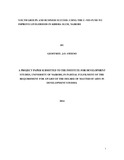| dc.description.abstract | is study explores whether the Community Youth Enterprise Scheme (C-YES) helps
youth groups establish successful businesses, capable of improving livelihoods of poor
youths belonging to youth groups in Kibera slum, Nairobi.
Kibera slum was an ideal location for the study because a chunk of the first and second
disbursements of the C-YES funds in the larger Langata area went to youth groups in
Kibera, given its high youth unemployment rates in the expansive slum.
The study interviewed leaders and ordinary members of youth groups that were the first
beneficiaries of the C-YES Fund after it was established. A total of 31 out of 46 youth
groups were analysed. Both qualitative and quantitative methods of data collection were
used to gather the necessary information on C-YES, youth groups and their businesses.
Semi-structured questionnaires and observation methods were used to ensure adequate
and necessary data on youth groups was gathered.
The data was then analysed using qualitative methods of data analysis. A codebook was
developed to classify themes - using research questions as guide - and also help identify
other emerging themes from the fieldwork.
The study finds that the C-YES Fund is yet to make a major impact on the livelihoods of
poor youths in Kibera, a confirmation that access to funds is not a panacea for the
establishment of successful business and improvement of livelihoods. There are other
intervening factors that determine success and sustainability of businesses and betterment
of livelihoods. This is because despite the disbursement of millions of shillings in 2007
and 2008, more than half of the businesses established by youth groups that benefited
from C-YES collapsed even before celebrating their fifth anniversary.
The study puts forward several recommendations, the major one being addressing the
intervening factors that prevent the youths from establishing successful businesses. The
government‘s action should be geared towards developing a proper follow up strategy to
monitor businesses established and offer expertise advice whenever needed. | en_US |

